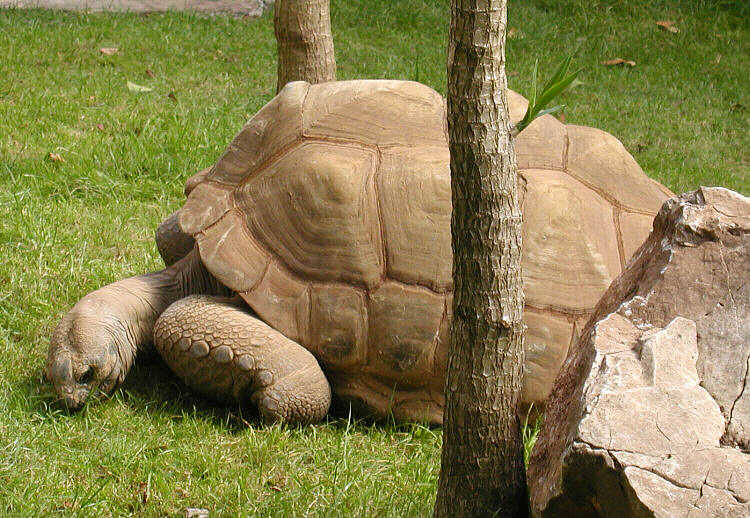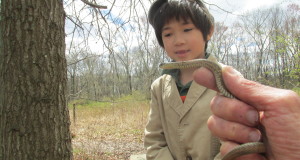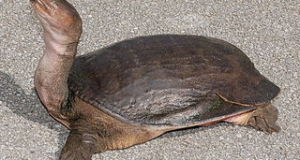 While pet-keeping suffices for many herp enthusiasts, some with particularly deep interests can only be happy when working with reptiles and amphibians full time. My own path to career in herpetology, while twisted (even “tortuous” at times!), was well worth the struggle…as you can see by the attached photos, I’m very fortunate (please also see this article). In Part 1 I highlighted several important steps one can take to lay the foundation for a career in herpetology. Following are some further thoughts.
While pet-keeping suffices for many herp enthusiasts, some with particularly deep interests can only be happy when working with reptiles and amphibians full time. My own path to career in herpetology, while twisted (even “tortuous” at times!), was well worth the struggle…as you can see by the attached photos, I’m very fortunate (please also see this article). In Part 1 I highlighted several important steps one can take to lay the foundation for a career in herpetology. Following are some further thoughts.
Join Local Herpetological Societies
Friendships, field trips, opportunities to be published – just take a look at The NY Turtle & Tortoise Society to see what is possible. This group, my favorite, sponsors and supports turtle-viewing expeditions, day-long seminars featuring leading herpetologists, local and international rescue efforts, turtle shows, legislative updates and much more; not all herp societies are as well-organized, but there is great potential everywhere.
Professional Groups and Publications
If possible, join a professional herpetological organization and read its journal (note: none are inexpensive, but student memberships are sometimes available). This will introduce you to research, people and opportunities of which you may be unaware. My favorite is the Society for the Study of Amphibians & Reptiles.
Zoo and Museum Memberships
 Member-only benefits such as behind the scenes tours of the American Museum of Natural History’s herpetology collection left life-long impressions on me, and have shaped the futures of many biologists…there are unlimited possibilities.
Member-only benefits such as behind the scenes tours of the American Museum of Natural History’s herpetology collection left life-long impressions on me, and have shaped the futures of many biologists…there are unlimited possibilities.
Volunteer
Volunteer work with zoos, museums, nature centers, professors and others is rewarding and may lead to employment opportunities; please see the article below.
Education
A 4 year degree is needed for most entry level herp-related jobs (including animal keeper). Advanced degrees will broaden your opportunities and adventures.
Cornell University and the Universities of Kansas and Florida, among others, are famous for producing noted herpetologists. Please see the ASIH article below for a list of schools and ideas.
Alternative Paths
Options abound…I know of people that pursue their passion for herps by working as photographers, veterinary technicians, breeders, bio-medical researchers, writers, rescue center operators and teachers…it’s a tough field to break into, but well, well, worth the effort.
Further Reading
New York Turtle & Tortoise Society’s Turtle Rescues in Brooklyn: a fine example of a herp society in action.
Careers in Herpetology (Society of Ichthyologists & Herpetologists); includes a list of colleges and universities known for strong herpetology programs.
 That Reptile Blog – Reptile, Amphibian and Exotic Pet Care and Information
That Reptile Blog – Reptile, Amphibian and Exotic Pet Care and Information



Hey,
I read your username and i figure your the best person to ask this. Im about to start college soon as I’m finishing high school and I really would like to work my way up to a zoologist. Defiantly not the average 18 year old defiantly know a lot of various animals especially on hands on experiences with various pets honestly probably around 12-20 species of animals I’ve had but coarse some like the savannah monitor I had had to be brought to a zoo, actually a reptile zoo down in long island.
Well enough about that as that defiantly won’t be enough to plead a reasonable case.
My questions are:
What courses in college do you recommend as it seems sketchy when I look online. All my years of high school Ive done science but of coarse enjoyed biology especially now that I’m taking a college coarse in biology currently in my last year of high school.
Is there some where I can apply for the Bronx Zoo for lets say a zookeeper’s assistant or anything of that nature as Im pretty sure I don’t meet the qualifications to right off the back become a zookeeper.
Is there like a test or something of the nature in order to work for the bronx zoo? By work I mean animal related of coarse not just someone working the concession stands lol
Any tips or suggestions?
Thanks a million I look forward to your response!
Hello Tony,
Please see the info and links below for more becoming a herpetologist…much is applicable to zoology careers as well. For either field, a major in biology or zoology would be ideal, but individual schools may be able to provide other options …discuss with career counselors as well, as some of my info may be dated. Please also see the link to colleges offering herpetology courses; but basic biology or zoology will prepare you for a wide array of careers…you can always specialize as time goes on. There is, I believe, a college in Fla (Santa…?) that prepares students for work as a zookeeper, but I would not recommend this route unless the college also offers traditional 4 year bio degrees, etc…not a good idea to limit yourself to zookeeping early-on (please see below).
The Bronx Zoo’s Dept. of Herpetology has always used volunteer interns …that would be a great way to gain experience. I’ll email you with the phone contact info. The BZ Children’s Zoo hires young people as well, check the BZ Human Resources Dept for info, as I’m not sure about contacts, procedures there. ork in nature centers, volunteering with local professors, etc,. is preferable o pet store work as experience. Please see linked articles below.
Important to begin reading professional journals; the major ones are expensive, butsee Herp Conservation and Bio link below (free, online); this will give you an idea of the type of work being done, and by whom.
You’ll need a 4 year degree for an entry level animal keeping job at larger, well known zoos; a master’s degree to move into other areas, and a PhD for higher level curatorial, museum research jobs etc. Field work was a favorite of mine, but I did it as an aside to my work for the zoo…pure fieldwork is usually from “grant to grant”, and not as easy route to go, but many do and would not trade. Bronx Zoo and some others employ full time field people, generally PhD’s or graduate students. While it may be easier to rise in ranks in smaller zoos, larger well-funded orgs offer more options in most cases. Zoo keeping is wonderful at many zoos, and many get hooked on it early on. However, salaries are abysmally low, given the education required, esp. if you live in/near a large city, some folks work as keepers, take more schooling while working (I did this re my masters) and then seek other jobs. Some zoos have a policy against promoting keepers to higher levels (at least above supervisor) but rarely admit this, so you’ll need to find that sort of info out from staff members, etc. But a keeper position in, i.e. the Bronx Zoo, has often been a stepping stone to curatorial spots elsewhere.
Colleges with Herpetology Programs http://www.anapsid.org/resources/univ.html
Volunteering, esp for biology professors but also zoos, nature centers etc is invaluable; also, working with specific professors as you go on is very impt..the connections they provide are vital. I was shy, always juggling several jobs, and missed this aspect…makes the road more difficult if you try to go it on your own.
Some go into full time teaching at universities, locking in a paycheck etc, consulting on the side and doing field research, perhaps supported by the college, in summer.
For further career info, please see:
CNAH website http://www.naherpetology.org/
SSAR: Careers in Herpetology http://www.ssarherps.org/pages/careers.php
ASIH http://www.asih.org/jobs
American Zoo Association job list http://www.aza.org/joblistings/ will give you an idea of the types of positions available at zoos, sometimes includes field research, museum work.
Careers in Herpetology http://blogs.thatpetplace.com/thatreptileblog/2011/02/04/the-10-best-ways-to-prepare-for-a-career-in-herpetology-part-1/ and http://blogs.thatpetplace.com/thatreptileblog/2011/03/25/the-10-best-ways-to-prepare-for-a-career-in-herpetology-part-2/
Professional Herp Journals http://blogs.thatpetplace.com/thatreptileblog/2010/12/23/professional-herpetological-organizations-and-journals-part-1/,
http://blogs.thatpetplace.com/thatreptileblog/2010/12/30/professional-herpetological-organizations-and-journals-part-2/
Herpetological Conservation and Biology (free, online) http://www.herpconbio.org/index.html
Herp Digest (free, online) http://www.herpdigest.org/
Some related fields that may offer much more in the way of salary, opportunity include bio-medical research (medicine from frog skin, etc), agricultural pest research, conservation genetics, etc.
Best, Frank
You’ll need a 4 year degree for an entry level animal keeping job at larger, well known zoos; a master’s degree to move into other areas, and a PhD for higher level curatorial, museum research jobs etc. Field work was a favorite of mine, but I did it as an aside to my work for the zoo…pure fieldwork is usually from “grant to grant”, and not as easy route to go, but many do and would not trade. Bronx Zoo and some others employ full time field people, generally PhD’s or graduate students. While it may be easier to rise in ranks in smaller zoos, larger well-funded orgs offer more options in most cases. Zoo keeping is wonderful at many zoos, and many get hooked on it early on. However, salaries are abysmally low, given the education required, esp. if you live in/near a large city, some folks work as keepers, take more schooling while working (I did this re my masters) and then seek other jobs. Some zoos have a policy against promoting keepers to higher levels (at least above supervisor) but rarely admit this, so you’ll need to find that sort of info out from staff members, etc. But a keeper position in, i.e. the Bronx Zoo, has often been a stepping stone to curatorial spots elsewhere.
Colleges with Herpetology Programs http://www.anapsid.org/resources/univ.html
Volunteering, esp for biology professors but also zoos, nature centers etc is invaluable; also, working with specific professors as you go on is very impt..the connections they provide are vital. I was shy, always juggling several jobs, and missed this aspect…makes the road more difficult if you try to go it on your own.
Some go into full time teaching at universities, locking in a paycheck etc, consulting on the side and doing field research, perhaps supported by the college, in summer.
For further career info, please see:
CNAH website http://www.naherpetology.org/
SSAR: Careers in Herpetology http://www.ssarherps.org/pages/careers.php
ASIH http://www.asih.org/jobs
American Zoo Association job list http://www.aza.org/joblistings/ will give you an idea of the types of positions available at zoos, sometimes includes field research, museum work.
Careers in Herpetology http://blogs.thatpetplace.com/thatreptileblog/2011/02/04/the-10-best-ways-to-prepare-for-a-career-in-herpetology-part-1/ and http://blogs.thatpetplace.com/thatreptileblog/2011/03/25/the-10-best-ways-to-prepare-for-a-career-in-herpetology-part-2/
Professional Herp Journals http://blogs.thatpetplace.com/thatreptileblog/2010/12/23/professional-herpetological-organizations-and-journals-part-1/,
http://blogs.thatpetplace.com/thatreptileblog/2010/12/30/professional-herpetological-organizations-and-journals-part-2/
Herpetological Conservation and Biology (free, online) http://www.herpconbio.org/index.html
Herp Digest (free, online) http://www.herpdigest.org/
Some related fields that may offer much more in the way of salary, opportunity include bio-medical research (medicine from frog skin, etc), agricultural pest research, conservation genetics, etc.